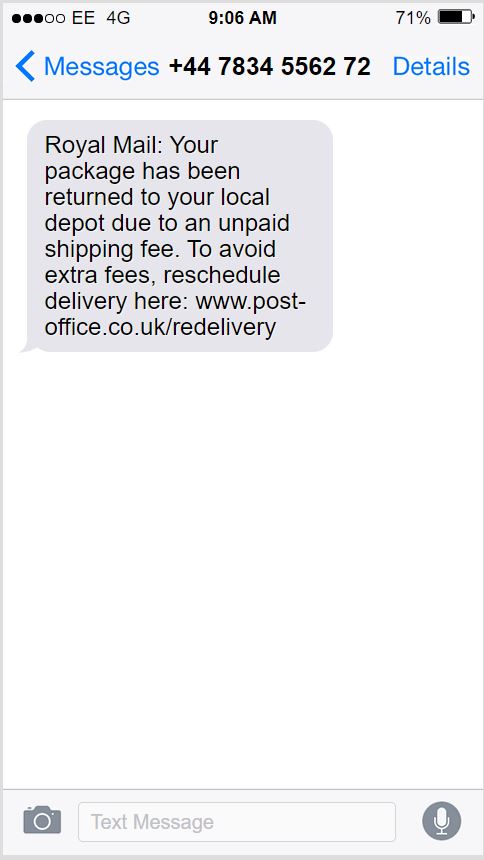How to protect yourself against parcel delivery scams

Reading time 4 minutes
At a glance:
Parcel delivery scams are messages that pretend to come from delivery companies.
Texts try to encourage people to pay a small fee using a link that is used to steal personal details.
This type of scam can crop up more at Christmas, when you might have more parcels being delivered than usual.
How does a parcel delivery scam work?
In periods where you are more likely to be buying lots of items online – like Christmas – you may receive a text or email claiming to be from a delivery company.
The message may say that your package is delayed, or needs a small payment to be delivered. These messages can be difficult to tell apart from a real text or email.
The goal of the scam could be to trick you into entering your card details into a fraudulent website.
Or, the scam may encourage you to install an app or click a link that contains spyware. This is software used to steal personal and banking details.
There can sometimes be another step. You may be contacted after the initial fraud has taken place to encourage you to move money into a scammers account for ‘safety’.
If you think you’ve received a parcel scam – don’t open any links that are attached the text or email.
The message may say that your package is delayed, or needs a small payment to be delivered. These messages can be difficult to tell apart from a real text or email.
The goal of the scam could be to trick you into entering your card details into a fraudulent website.
Or, the scam may encourage you to install an app or click a link that contains spyware. This is software used to steal personal and banking details.
There can sometimes be another step. You may be contacted after the initial fraud has taken place to encourage you to move money into a scammers account for ‘safety’.
If you think you’ve received a parcel scam – don’t open any links that are attached the text or email.
Parcel delivery scams explained
Hannah Bingle, our Financial Crime Awareness Specialist, explains how parcel delivery scams target busy people:
Between shopping, celebrating, food prep and gift wrapping, the festive season can be one of the busiest times of the year.
As people save time by buying online, we tend to see an increase in criminals sending emails and texts posing as delivery companies.
These messages can be really convincing. They often contain a link to a fake website, or a demand for courier fees. When people are busy or waiting for parcels, they’re much more likely to be affected by this type of scam.
By knowing what to look out for and following Take Five’s advice to ‘Stop, Challenge, Protect,’ people can enjoy their festivities while staying safe from fraud.
Examples of parcel delivery scams
There are lots of ways a parcel delivery scam can work, for example, you may receive a message claiming that:
A small fee has to be paid to get your package – it may try to scare you by stating your package will be sent back or to a depot if you don’t pay.
A package you’ve sent will be returned, as the address was incorrect. You’ll be asked to enter your personal and payment details.
A company tried to deliver a package, but you were out. Often this scam will include a link to schedule redelivery.
A parcel isn’t going to be delivered unless you download an app. These apps can contain spyware to capture your personal details when you next use them.
How to spot a parcel delivery scam
Check the number
A scam text message will often arrive as a mobile number, rather than from an official source.
They try to rush you
A scam will often try to get you to act quickly, without taking a second to think. If a message is trying to get you to give them your details quickly, this is suspicious.
Lacks details about your package
Delivery scams are often vague and won’t be specific about where the parcel is coming from – or what’s inside.
Spelling and grammatical errors
A common way to spot a scam is spelling errors – check for mistakes or broken English. You may also see exclamation marks or strange capitalisation on fraudulent messages.

Royal Mail will never use text or email to collect fees
If your message is from Royal Mail and it’s asking you to pay a fee, you can be sure it’s a scam. Royal Mail will never ask you to pay fees in this way.
How to report a parcel delivery scam
If you’ve received a suspicious message, you can report it.
Report a scam text
To report a parcel delivery scam that you’ve received over text, forward it on for free to 7726. Most phone networks support this scheme.
Report a scam email
If the scam has arrived in your inbox, you can report it by emailing a screenshot to report@phishing.gov.uk.
You can also check the list of recent scams on the Royal Mail website.
The content on this page is for reference. It is not financial advice. For help with money issues, try MoneyHelper.


